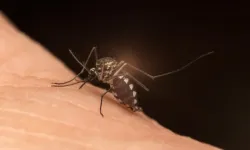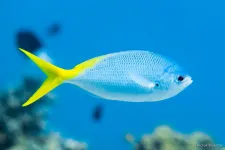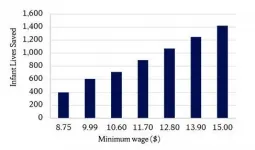Eight recommendations to improve apps for neglected tropical diseases
UOC researchers have analysed 13 apps developed for the treatment and control of neglected tropical diseases, identifying the main weaknesses and evaluating possible improvements
2021-01-26
(Press-News.org) A study performed by the Universitat Oberta de Catalunya (UOC) provided eight recommendations for improving the online technology to help with the treatment and diagnosis of neglected tropical diseases (NTDs). The analysis, presented in a recent open-access publication, was performed by UOC researchers Carme Carrion and Marta Aymerich from the eHealth Lab and Noemí Robles from the eHealth Center, together with José Antonio Ruiz Postigo from the World Health Organization and Oriol Solà de Morales from the Health Innovation Technology Transfer Foundation. In the study, the authors looked at the context of the existing apps and identified their weaknesses.
The recommendations, outlined in this infographic prepared by the UOC eHealth Center, are the result of analysing 13 apps out of a total of 133 candidates, and highlight both their weaknesses and their possibilities for improvement. The goal is to standardize and improve the apps developed for controlling and monitoring neglected tropical diseases of the skin, an even more neglected subgroup of NTDs.
Neglected tropical diseases affect more than a billion people and cause hundreds of thousands of deaths every year. In spite of this, most people still know very little about them. This is the second year that the World NTD Day has been held on 30 January.
More efficient, better uptake
The recommendations given by Carrion's team in the form of a guide provide an initial base for improving the efficiency in the development and social uptake of apps designed for the control and treatment of NTDs. These recommendations are summarized in eight points:
Nobody should be left out: patients from all regions should be selected to benefit from the proposed interventions. This requires translating the tools into different languages. At the very least, into Portuguese and Spanish in the Americas; and English, French and Portuguese in Africa.
Users must have control: the interventions' end users (health professionals and patients) must be given sufficient training to improve their digital literacy and make effective use of the tools that are provided.
Complexity must be adequately catered for: integrating e-health-related technology is a complicated process that should be considered in depth both before and during implementation.
Utility and simplicity must be there, and, what is more, they must be seen: health professionals, patients and healthy citizens must be able to understand the proposed technology's utility and ease of use. In other words, it must be a facilitator, not a barrier.
The technological requirements must be considered from the beginning: the availability of adequate mobile devices, the potential problems with electricity supply or internet networks, and other technical issues must be considered as part of a comprehensive strategy with a specific objective.
A long-term m-health platform must be established: an m-health intervention's success depends on the existence of a platform that makes it easier not only to implement the tool but also guarantees its sustained, effective use.
Split-level processes are required to improve: in the early stages of implementation of an m-health system, the processes must be divided into two levels in order, first, to refine the process and, then, to optimize it iteratively.
The tool must meet the stated needs: interventions are integrated in a specific health service; accordingly, additional tools should be considered as required.
One of the main challenges faced by this type of app, explained Carme Carrion, also affiliated with the UOC's eHealth Center, is the digital divide, but not in its connotation as a knowledge problem: "The technological features are limited. You can't design interventions that can only be used by a few people, because that widens the health gap and inequality," said the expert. "You've got to look for simple, cheap solutions that leave no one behind, that can be taken to everyone, and not just these communities' socioeconomic elites. That's where the challenge is."
E-health: an opportunity
"There are a series of problems in the countries where these diseases are endemic," explained this expert in e-health solutions. "For example, access to mobile devices by the population, broad band, reliable internet connections, batteries [...]. The number of existing apps related with tropical skin diseases is small. Compared with other, more general health apps, there are few apps available, even in Google Play or Apple Store. And the few that exist have virtually no scientific articles to back them," she continued.
"WHO - who the UOC works with closely on increasing awareness of the NTDs - has been promoting m-health in these countries for more than 10 years, precisely because, in certain areas, in spite of the difficulties, it is much easier to communicate with a mobile phone and make video calls than to transport people physically." However, "in order to do it well, we must have information that reviews the apps' quality," added the researcher, in order to improve their integration and the services that help combat this type of disease.
INFORMATION:
[Attachments] See images for this press release:

ELSE PRESS RELEASES FROM THIS DATE:
2021-01-26
Announcing a new publication for BIO Integration journal. In this opinion article the authors Tianhong Yao, Huirong Lin, Jingsong Mao, Shuaidong Huo and Gang Liu from Xiamen University, Xiamen, China discuss CT imaging features of patients infected with 2019 novel coronavirus.
Novel coronavirus pneumonia is an acute, infectious pneumonia caused by a novel coronavirus infection. Computed tomographic (CT) imaging is one of the main methods to screen and diagnose patients with this disease. In this article the authors discuss the importance and clinical value of chest ...
2021-01-26
Damage to the brain gray matter plays an important role in the progression of multiple sclerosis. This study now shows that such damage can be caused by inflammatory reactions that lead to loss of synapses, which impairs neural activity.
Multiple sclerosis (MS) is a chronic inflammatory disease that affects the central nervous system, in which nerve cells are attacked by the patient's own immune system. In many cases, the disease develops into a progressive form, which is characterized by a shift of pathology from the white matter to the gray matter, ...
2021-01-26
Every year, more than 400,000 people die from malaria, the majority are children under the age of five years old, who die from a disease which affects more than 200 million people a year.
The most serious form of the disease is cerebral malaria which may cause severe neurological consequences and, in the worst-case scenario, result in death. The precise mechanism behind cerebral malaria has remained a mystery - until now, says a research group from the Department of Immunology and Microbiology at the University of Copenhagen.
'In our study, we show that a certain type of the malaria parasite can cross the blood-brain barrier by utilising ...
2021-01-26
Mangrove ecosystems are at particular risk of being polluted by plastic carried from rivers to the sea. Fifty-four per cent of mangrove habitat is within 20 km of a river that discharges more than a tonne of plastic waste a year into the ocean, according to a new paper published in the journal Science of the Total Environment. Mangroves in southeast Asia are especially threatened by river-borne plastic pollution, the researchers found.
The paper, written by scientists at GRID-Arendal and the University of Bergen, is the first global assessment of coastal environments' exposure to river-borne plastic pollution. The majority of plastic waste carried to sea by rivers ends up trapped along coastlines, but some types ...
2021-01-26
FORT LAUDERDALE/DAVIE, Fla. - Global warming or climate change. It doesn't matter what you call it. What matters is that right now it is having a direct and dramatic effect on marine environments across our planet.
"More immediately pressing than future climate change is the increasing frequency and severity of extreme 'underwater heatwaves' that we are already seeing around the world today," Lauren Nadler, Ph.D., who is an assistant professor in Nova Southeastern University's (NSU) Halmos College of Arts and Sciences . "This phenomenon is what we wanted to both simulate and understand."
Nadler is a co-author of a new study on this topic, which you can find published online ...
2021-01-26
Scientists have designed a single-dose universal vaccine that could protect against the many forms of leptospirosis bacteria, according to a study published today in eLife.
An effective vaccine would help prevent the life-threatening conditions caused by leptospirosis, such as Weil's disease and lung haemorrhage, which are fatal in 10% and 50% of cases, respectively.
Leptospirosis is caused by a diverse group of spirochetes called leptospires. A broad range of mammals, including rats, harbour the bacteria in their kidneys and release them into the environment through their urine. Humans and animals can then get infected after coming into contact with contaminated water or soil. In addition to having a major impact on the health of vulnerable human populations, ...
2021-01-26
Syracuse, N.Y. - As President Joe Biden seeks to raise the federal minimum wage, a new study published recently by researchers from Syracuse University shows that a higher minimum wage will reduce infant deaths.
In the study, "Effects of US state preemption laws on infant mortality," Syracuse University professors found that each additional dollar of minimum wage reduces infant deaths by up to 1.8 percent annually in large U.S. cities. The study was published recently by Preventive Medicine.
The federal minimum wage has not been increased since 2009, and Biden's $1.9 trillion American Rescue Plan to aid those hit hardest by the COVID-19 pandemic calls for Congress to raise the minimum wage from $7.25 ...
2021-01-26
CAMBRIDGE, MD (January 26, 2021)--The Chesapeake Bay has a long history of nutrient pollution resulting in degraded water quality. However, scientists from the University of Maryland Center for Environmental Science are reporting some improvements in the Choptank River on Maryland's Eastern Shore.
The Choptank is a tributary of Chesapeake Bay, and its watershed lies primarily in the state of Maryland, with a portion in Delaware. There are strong similarities between the Choptank basin and the Chesapeake as a whole, which enables the Choptank to be used as a model for progress in the Bay.
The Chesapeake Bay is an estuary which has undergone considerable ...
2021-01-26
Researchers from McGill University have discovered, for the first time, one of the possible mechanisms that contributes to the ability of lysergic acid diethylamide (LSD) to increase social interaction. The findings, which could help unlock potential therapeutic applications in treating certain psychiatric diseases, including anxiety and alcohol use disorders, are published in the journal PNAS.
Psychedelic drugs, including LSD, were popular in the 1970s and have been gaining popularity over the past decade, with reports of young professionals claiming to regularly take small non-hallucinogenic micro-doses of ...
2021-01-26
Black holes are considered amongst the most mysterious objects in the universe. Part of their intrigue arises from the fact that they are actually amongst the simplest solutions to Einstein's field equations of general relativity. In fact, black holes can be fully characterized by only three physical quantities: their mass, spin and charge. Since they have no additional "hairy" attributes to distinguish them, black holes are said to have "no hair": Black holes of the same mass, spin, and charge are exactly identical to each other.
Dr. Lior Burko of Theiss Research in collaboration with Professor Gaurav Khanna of the University of Massachusetts Dartmouth and the University ...
LAST 30 PRESS RELEASES:
[Press-News.org] Eight recommendations to improve apps for neglected tropical diseases
UOC researchers have analysed 13 apps developed for the treatment and control of neglected tropical diseases, identifying the main weaknesses and evaluating possible improvements





